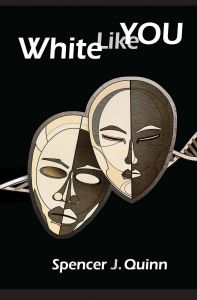I’m On Team Normal

Image from Shawn Braley, Valley News
1,181 words
About a year and a half ago, an associate professor at a European university reached out to me over Facebook. He politely invited me to an interview. This is what he wrote (links added):
I am working on an academic project about novels, novellas and short stories published by Counter-Currents Publishing and Arktos Media. The project’s working title is ‘Imagining Alternative Worlds’. I am interested in topics raised in these works, the authors’ creative processes and motivations, as well as their views on the function of their writing more generally.
I have read your ‘White Like You’, and I would be extremely grateful if you could agree to be interviewed online (30-60 minutes, audio-only if you prefer). I have also read ‘Charity’s Blade’ and ‘My Mirror Tells a Story’, but while the interview might touch on these two too, it would focus on ‘White Like You’.
I was, of course, flattered to be considered important enough to be the subject of an interview. That hasn’t happened terribly often in my career as a dissident scribbler, and never before by a total stranger in the mainstream. I quickly considered the upside. Such exposure could help spread our ideas and win converts, to say nothing of raising my own profile. My interlocutor promised not to include any quote from me without my permission and seemed perfectly reasonable. Maybe this was a big opportunity? I was certainly excited, but at the same time wary. I didn’t like the fact that many of his publications included the term “far Right” in both text and title. That rang alarm bells for me.

You can buy Spencer Quinn’s novel White Like You here.
Far Right. Is that what I am?
I’m on the Right, certainly. If anything, the term “Right” more or less asserts a person’s adherence to the truth behind tradition, nationalism, race- and sex-realism — the Old Gods, basically. It also serves to distinguish oneself from one’s opposite, the Left, which promotes everything that is opposed to all of the above. Lies, essentially. Jim Goad and I have gone back and forth on how to describe this thing of ours. It seems that he believes that the Right-Left distinction is less meaningful than its underlying racial components: either you’re pro-white or you’re anti-white. Pick one. He’s not wrong; it is possible for one to be Right-wing and anti-white. Jews who push for racial integration in America while promoting segregation of non-Jews in Israel are a prime example. It’s also possible, at least historically, for one to be Left-wing and pro-white, such as the socialist author Jack London.
Still, however, I prefer to keep with the terms Right and Left. They link us to the past, when political divisions were more about class than race and sex, as they are now. You can draw a straight line from thinkers such as Carl Schmitt, Julius Evola, and Francis Parker Yockey to the issues we face today. The same with Karl Marx, Franz Boas, and Max Horkheimer — one of the originators of critical theory, which has taken over much of our educational system in the past few decades. Abandoning Left and Right takes us away from that. Yes, their definitions evolve over time. But in the field of politics, what doesn’t?
Also, what I consider to be the Left-Right distinction encapsulates more than just race. For example, a global warming activist blocking traffic or a drag queen reading stories to children could be perfectly agnostic about race, and yet must still belong to the Left, according to my definition of the term.
But “far Right?” I’m not comfortable with that because it implies ideas which are violent, unhealthy, and otherwise extreme. What mainstream academia calls “far Right,” I call normal. Where Candace Owens says she is on “team God,” I feel like I am on team normal. A century ago, when living conditions were much harsher than they are today and all people had to constantly fight and scrape for their very survival, whites could less afford fanciful notions about egalitarianism, progressivism, and political correctness. They understood the truth behind race, gender, and ethnicity. They understood the importance of tradition and tribalism. This was all part of mainstream discourse, and whites typically could not give a hang if outgroup members felt otherwise. If anything, many non-whites were on the Right as well back then — in order to remain on whites’ good side. Not a bad position to be in in 1920.

You can buy Spencer J. Quinn’s novel Charity’s Blade here.
Being on the Right today means that one holds to the past and believes that, thanks to the influence of the Left, Western culture has become corrupted, both morally and spiritually, and has lost its way as a result. This doesn’t mean that Right-wingers today wish to return to slavery or the divine right of kings. There is some progress the vast majority of us do not want to reverse. The great republican experiment, which more or less started in 1789, has tempered the Right somewhat — and not entirely for the bad. Human rights should be sacrosanct. Democracy in limited forms should be encouraged. Freedom of speech, religion, the press, and to bear arms are all good things.
I think the term “far Right” is simply a smear to describe one who is uncompromising in the face of lies and degeneracy, and who is willing to resist the unscrupulous power-mongers who promote such things. This is the real Right in my opinion, and without it, Western civilization would perish in a great, bloody cataclysm as Russia did in 1917.
This is how I responded to our academic friend:
I will agree to grant you an interview in print (not vox or video) if you will first return the favor by allowing me to interview you (in print) for Counter-Currents. After reading your essays, I will send you a list of several questions. Thanks.
He refused, naturally, and that was the end of our conversation. Typically, people on the Left do not like to have the tables turned on them. I think that whenever Leftists interview someone on the Right, much of their motivation is to make their readers gawk at how old-fashioned and reactionary some people can still be in this day and age. I have no idea if this individual in particular had such a scheme in mind. Maybe not. But it seems that most ideologues on the Left these days believe that Right-wing ideas refute themselves. All they have to do is give some lost soul on the Right a platform, and he’ll embarrass himself by running his mouth.
The assumption here is that Left is normal and Right is not. This is false. Agreeing to be interviewed by a Leftist on his own (Leftist) terms in a way accepts this falseness as true — as if liars would ever engage a truth-teller in good faith. When interacting with the Right in any form, Leftist goals are always to enforce Leftist perspectives and discredit Rightist ones — despite any claims of impartiality. People on the Right should never let that happen. If anything, we should be interviewing them. After all, we’re the ones who are normal.



